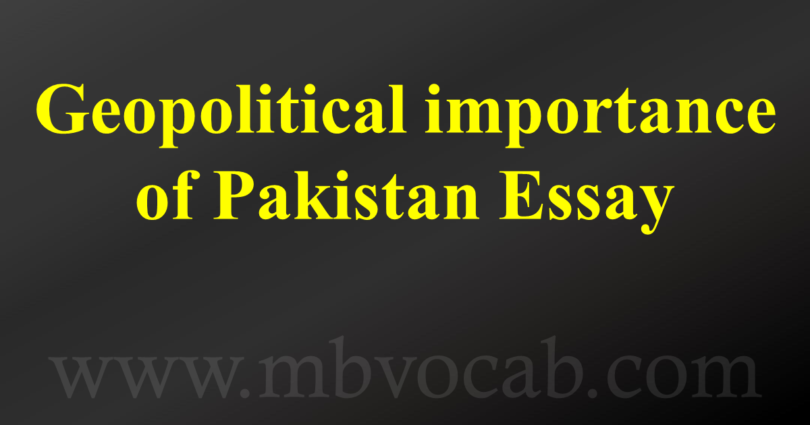Pakistan’s geopolitical significance looms large, driven by its intricate placement on the global stage. To the west of Pakistan lies the Gulf States, endowed with abundant oil reserves, satisfying the energy demands of the industrially advanced world. In return, a myriad of commodities finds their way to the Gulf States. Pakistan’s maritime ports serve as pivotal nodes on vital transit routes, amplifying its strategic value. Moreover, Pakistan shares borders with China, a burgeoning superpower, and it finds itself entwined in the competitive dynamics between China, the United States, and other influential nations. Russia, also a major global player, though geographically distant, cannot afford to overlook Pakistan’s geo-strategic positioning. In the past, during its Soviet incarnation, Russia harbored ambitions of securing access to Pakistan’s coastlines, a move that would have allowed it to exert control over the world’s sea-trade routes. This historical context sheds light on the West’s unwavering support for Pakistan and the Afghan people when Soviet forces occupied Afghanistan in 1979.
Situated at the heart of the Muslim World, Pakistan’s prominence is unmistakable on the geopolitical map. To the east and southeast, a substantial Muslim minority resides within India, while neighboring Islamic nations like Bangladesh, Maldives, Malaysia, Indonesia, and Brunei further enhance the region’s Islamic identity. Stretching northward and northwestward, from Afghanistan to Siberia and the Caucasus Mountains, vast swathes of land are inhabited by adherents of monotheism. Similarly, to the west and southwest, from Turkey to the Atlantic Ocean, the Islamic World extends its influence. Pakistan, as the inaugural Nuclear Power of the Muslim World, holds a unique distinction.
Taking a broader perspective, the world assumes the character of a unified political entity. Modern advancements in transportation and communication have seamlessly transformed it into a global village. Consequently, all nations must forge interdependent relations to address their mutual requirements in the realms of defense, economics, and society. The foreign policy crafted by a nation to engage with the wider world is a reflection of its priorities.
For Pakistan, safeguarding and advancing Islamic ideology stands as a foundational tenet of its foreign policy. While different nations may consider varied factors in shaping their foreign policies, Pakistan places its ideological roots at the forefront. The objectives of Pakistan’s foreign policy can be delineated as follows:
- Safeguarding Regional Integrity and Sovereignty:
Since its inception, Pakistan has faced concerted efforts from certain nations aiming to undermine its administrative competence and national sovereignty. Thus, the preservation of its territorial integrity and freedom occupies a central position in its foreign policy. Pakistan extends moral and diplomatic support to nations struggling for their independence, such as Kashmir and Palestine. A balanced foreign policy, emphasizing non-interference in other nations’ affairs and resistance to external interference, is pivotal. - Upholding Ideological Foundations:
Islam serves as the bedrock of Pakistan’s ideology, and safeguarding this core principle remains paramount in its foreign policy. This objective materializes through the cultivation of friendly relations with like-minded nations sharing a belief in this ideology. Consequently, fostering amicable ties with Muslim-majority countries across the globe constitutes a key aspect of Pakistan’s foreign policy. - Fostering Economic Development:
The well-being and stability of a nation are intrinsically linked to economic progress. Pakistan, therefore, seeks to establish bilateral trade relations with countries capable of contributing to its economic growth. Persistent efforts are made to encourage wealthy nations to invest in Pakistan, a move that not only bolsters the government’s revenue through taxation but also generates employment opportunities. - Promotion of Cultural Exchange:
Culture, encompassing architecture, sports, attire, customs, traditions, values, and religious beliefs, forms the essence of a nation. Religion exerts a profound influence on culture, and Pakistan is renowned for its Islamic identity and distinct cultural heritage. Despite periods of alignment with the Western bloc, successive Pakistani governments have diligently worked to cultivate cultural bonds with nations worldwide. The establishment of the South Asian Association for Regional Cooperation (SAARC) aimed to strengthen cultural ties among its member states. In this vein, liberalized visa policies facilitate easy travel for citizens of member countries within the region.





